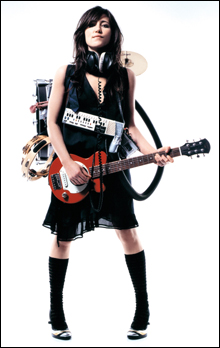 When Virgin released Kate “KT” Tunstall’s Eye to the Telescope in Great Britain last year, the then 29-year-old songstress looked forward to “playing to six or seven people at local Scottish coffee shops.” At least, that’s what she recalls thinking when I reach her in Minneapolis on a tour that’ll bring her to the Paradise this Friday, March 3. Her biggest fear, she says, was that she’d come off like Phoebe in Friends, dishing out daft songs like “Smelly Cat” to bored customers just looking for a caffeine fix. But as fate unfolded, multi-platinum rapper Nas unwittingly gave KT her moment to shine, and KT Tunstall, pop phenom, was born
When Virgin released Kate “KT” Tunstall’s Eye to the Telescope in Great Britain last year, the then 29-year-old songstress looked forward to “playing to six or seven people at local Scottish coffee shops.” At least, that’s what she recalls thinking when I reach her in Minneapolis on a tour that’ll bring her to the Paradise this Friday, March 3. Her biggest fear, she says, was that she’d come off like Phoebe in Friends, dishing out daft songs like “Smelly Cat” to bored customers just looking for a caffeine fix. But as fate unfolded, multi-platinum rapper Nas unwittingly gave KT her moment to shine, and KT Tunstall, pop phenom, was born
As Tunstall tells it, “I got a spot on a coveted TV show called Later . . . with Jools Holland. It’s the Holy Grail for British musicians. I had been playing clarinet and hitting a box with a stick at the time in a friend’s punk band. Then I get this call saying, ‘You have to come back to London because Nas has pulled out and they want you to do the spot.’ ‘I don’t have to rap my song do I?’, I asked. Anyway, that turned out to be my defining moment. I did Later with Jackson Browne, Anita Baker, and the Cure, and I played my first single, ‘Black Horse and the Cherry Tree.’ Afterwards, there was an on-line vote for best performance and I won 50 percent of the vote. It didn’t make sense. I got hundreds and hundreds of e-mails the next day. This song went mad, people just really connected with it.”

Suddenly Tunstall was the name to drop throughout Britain — particularly in her Scottish home town of Fife. Her singles stormed the charts. Later’s live version of “Black Horse and the Cherry Tree” landed at #28 on the British charts. The more atmospheric “Other Side of the World” rose to #13. And Tunstall’s playful take on poetic Patti Smith, “Suddenly I See,” captured the #12 spot. By the end of last year, a fourth single, the æthereal reverie “Under the Weather,” had made it to #39, her fourth to hit the Top 40, and Eye to the Telescope was the best-selling UK album by a female artist. Not bad for an artist who thought she was washed up before 30.
The fairy-tale scenario repeated itself this past January 20, when KT was about to begin a US tour in advance of the February 7 stateside release of Eye to the Telescope. Once again, “Black Horse and the Cherry Tree,” a folky yet aggressive acoustic guitar-based track that brings to mind Joan Armatrading and even Janis Joplin, hit a nerve. “I had a morning off in New York a few weeks ago, and management called and said, ‘The Today Show wants you to pop in.’ I didn’t know what The Today Show was. It sounded important, so I went and played for the booker, who asked me to appear that Friday. Everyone around me went mad. Three days later I was on US national television [accompanied by only by her acoustic guitar, a loop pedal she calls “Wee Bastard,” and a foot-stomped tambourine] without really realizing what that meant here. But basically the response has been a repeat of the Jools Holland show.”
Eye to the Telescope’s pre-sale ranking at Amazon shot from #558 to #18, and every one of her US tour dates has sold out. And Tunstall received three Brit Award nominations. The result: one overjoyed half-Scottish, half-Cantonese singer-songwriter.
“I am in a head spin,” she laughs. “It is a delightful way to start to an American trip, and it is a trip.”
What’s so special about this great unknown? Tunstall has one of those commanding, heart-melting, clean yet alluringly gritty voices that are hard to resist. And in her own understated way, she has star power. Add a handful of articulate, accessible crunchy folk-pop tunes that have already charted in Britain and you have one of the finest female singer-songwriters to emerge from the UK since PJ Harvey revealed her scary ribs and lurid red lips.
She’s certainly more conventional than Harvey. And her songs are quick pop wonders, like the Dido-esque “Other Side of the World” and “Suddenly I See,” which benefit from Steve Osbourne’s empathetic electro-organic production. Yet there’s an underlying melancholy, darkness, and turmoil that give Eye to the Telescope more depth than you might perceive at first. The overt pop hooks get her foot in the door: the subtler, tide-tossed broken rhythms underpinning the ominous “Miniature Disasters,” the tough love and self-reliance that inspire “Silent Sea,” and the jazzy vocal phrasings and surging melodies of the torchy “Heal Over” make it clear she plans on sticking around.